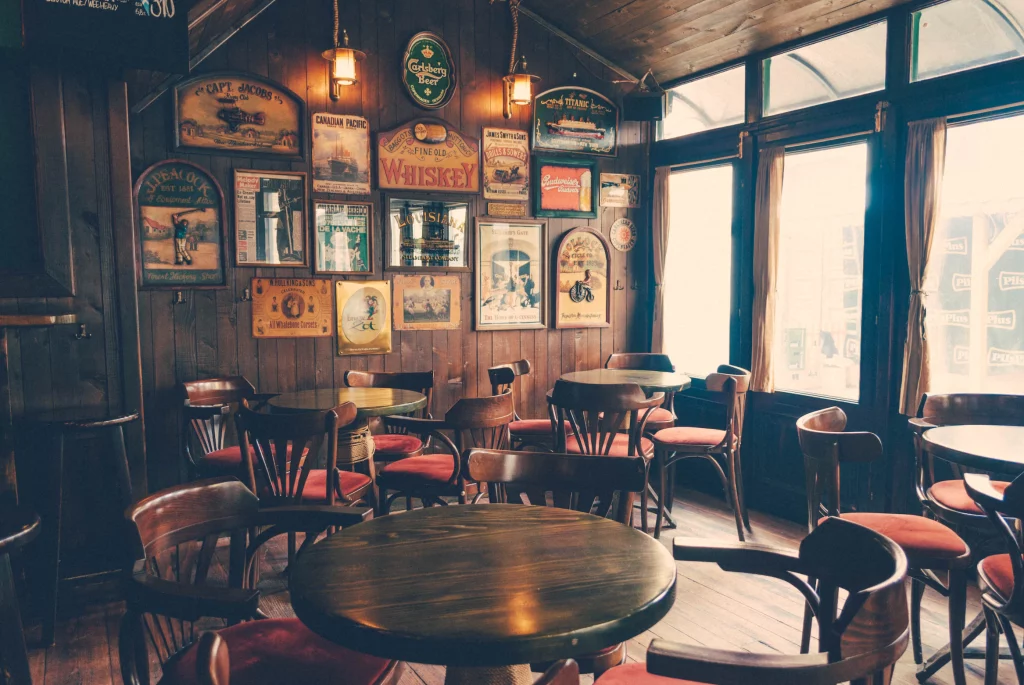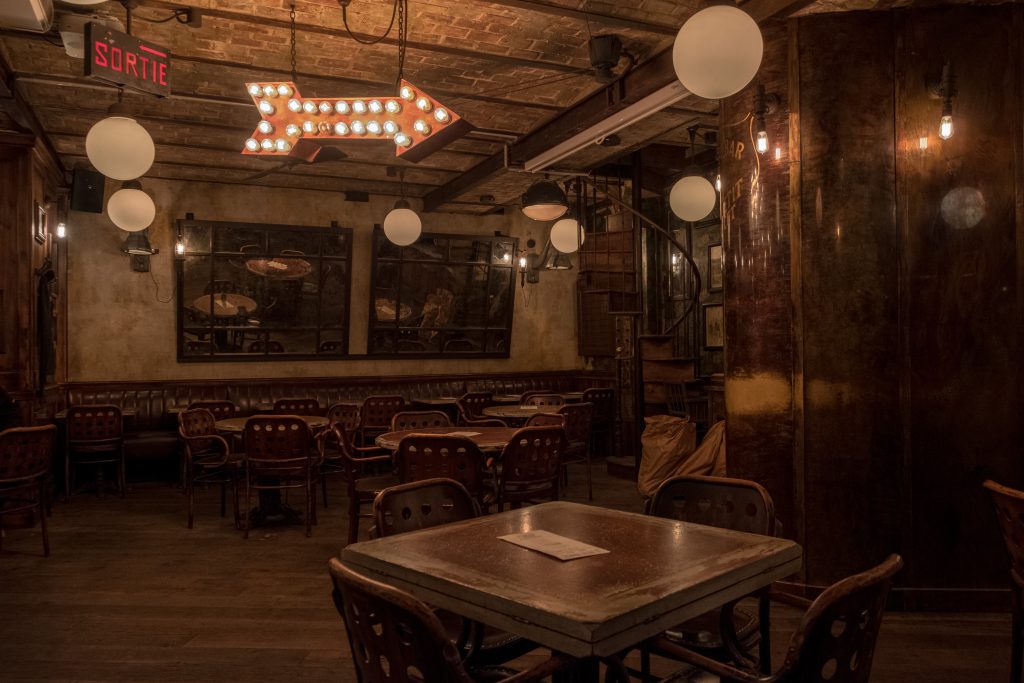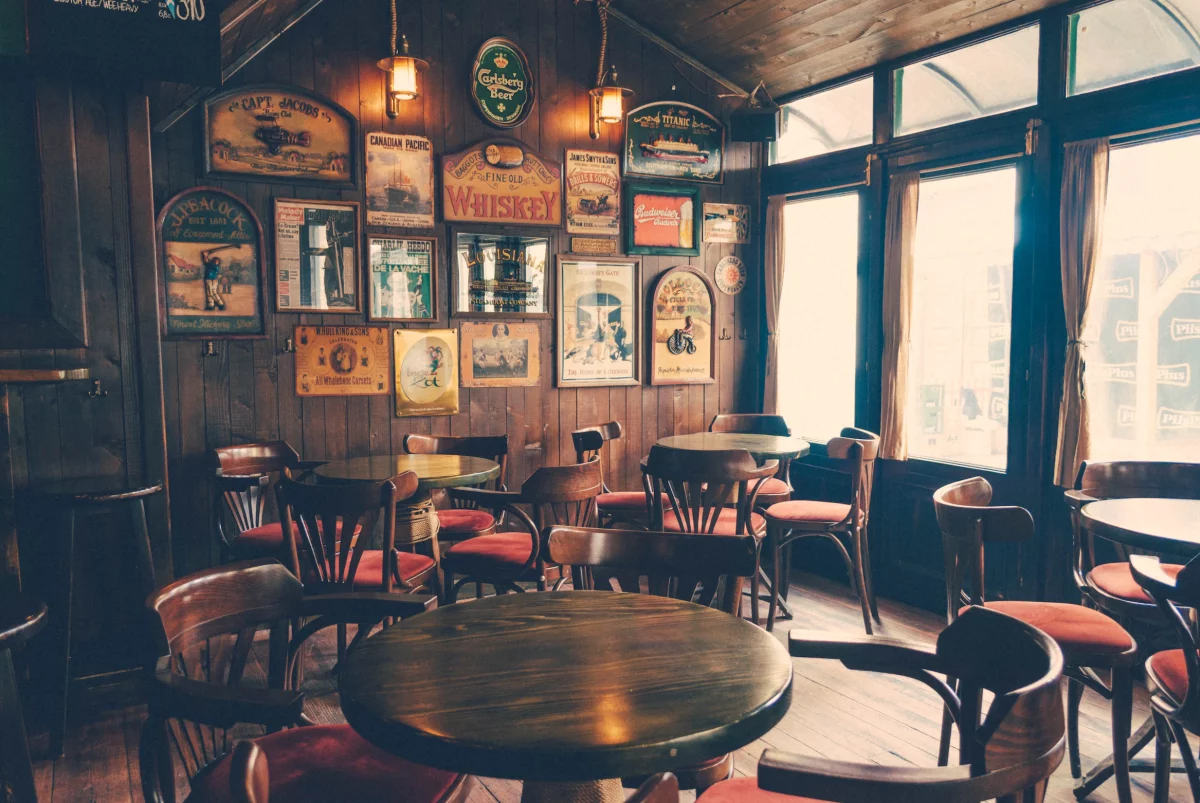A part of the history and social culture
A pub, short for “public house,” is an establishment that primarily serves alcoholic beverages such as beer, wine, and spirits, along with snacks or light meals.
Pubs are traditionally found in the United Kingdom and Ireland and are often considered a central part of those countries’ culture and social life. Pubs usually have a bar or counter serving drinks and seating areas for customers to enjoy their drinks and socialize with others.
Many pubs also entertain, such as with live music or televised sports events. Some pubs also have a restaurant section or serve full meals and drinks.
What is the history of pubs in the UK?
The history of pubs in the UK can be traced back to the Roman era when taverns and inns were established along the major roads to provide travellers with food, drink, and shelter.
However, the modern concept of a pub as a community gathering place emerged in the Middle Ages, when alehouses began to appear in towns and villages. Alehouses were places where people could come together to drink ale and beer, socialize, and discuss local news and events.
The term “public house” first came into use in the 17th century when the government introduced the licensing of premises selling alcohol. Brewers or publicans who provided the drinks frequently owned these licensed establishments, subject to laws and taxes. Over time, pubs became an essential part of British culture, serving as meeting places for all kinds of people, including workers, businesspeople, politicians, and artists.
In the 19th and early 20th centuries, pubs played a significant role in the working-class culture of Britain, with many being closely associated with the labour movement and trade unions. Pubs were also an important venue for political rallies, music, and other forms of entertainment.
Today, pubs remain an essential part of British culture, although their role has evolved. While many traditional pubs have closed or been converted to other uses, thousands of pubs across the UK serve as gathering places for locals and tourists alike.

What is the social significance of pubs in the UK?
Pubs have long been an important part of the country’s social fabric and are considered an essential part of British culture.
Here are some of the social significance of pubs in the UK:
- Community gathering place: Pubs are important for locals to socialize, meet friends and family, and catch up on local news and events. They are often the focal point of community life in many towns and villages, providing a space for people to come together and form social connections.
- Cultural heritage: Pubs are integral to British heritage and culture, many dating back centuries. They often have unique architectural features and historical significance, reflecting the local history and traditions of the area.
- Entertainment venue: Pubs often host live music, comedy, quizzes, and other forms of entertainment, providing a platform for local artists and performers.
- Tourist attraction: Pubs are popular with tourists, offering a glimpse into British culture and history. Many tourists visit famous pubs such as The Eagle in Cambridge, known as the birthplace of DNA research.
- Mental health benefits: Pubs can provide a sense of community and belonging, which can benefit mental health. They provide a safe and welcoming space for people to socialize and form connections, which can help to combat social isolation and loneliness.
How many pubs are there in the UK?
The number of pubs in the UK has been declining in recent years. As of 2021, there were still over 40,000 pubs in the country. The actual number varies as pubs are opened and closed regularly, but it is estimated that the UK has one pub for every 1,400 people.
Which is the oldest pub?
Determining the oldest pub in the UK is difficult, as many pubs have a long history, and their origins are often shrouded in legend and folklore.
However, several pubs claim the title of the oldest pub in the country. Some of these pubs include:
- Ye Olde Fighting Cocks in St Albans, Hertfordshire – This pub dates back to the 8th century and is said to be the oldest pub in the UK.
- The Royal Standard of England in Beaconsfield, Buckinghamshire – This pub claims to have been established in the 12th century, making it one of the oldest pubs in the country.
- The Bingley Arms in Bardsey, West Yorkshire – This pub is thought to have been established in the 10th century and is said to be the oldest pub in Yorkshire.
- Ye Olde Trip to Jerusalem in Nottingham – This pub was established in 1189 and is said to be the oldest pub in England.
While it is difficult to determine the exact age of these pubs, they all have a long history and are popular tourist attractions in their own right.

Image by Nicolas Hoizey from Unsplash
Interesting stories behind a few pubs
There are many interesting stories associated with pubs in the UK. One such story is the legend of the Mermaid Inn in Rye, East Sussex.
The Mermaid Inn is a historic pub from the 12th century. It was once a smugglers’ haunt and is said to have secret passages and hidden rooms where smugglers used to stash their contraband goods.
According to legend, the Grey Lady, a ghostly apparition, also haunts the pub. According to the story, the Grey Lady was a young woman who fell in love with a smuggler and helped him hide his contraband in the pub. However, when the smuggler was caught and executed, the young woman was left heartbroken and died of a broken heart. Her ghost is said to haunt the pub to this day and has been sighted by many visitors over the years.
Another interesting story is associated with The Eagle Pub in Cambridge. In 1953, two scientists, James Watson, and Francis Crick, announced that they had discovered the structure of DNA while having lunch at The Eagle. The pub has since become a popular destination for science enthusiasts and tourists, and a plaque outside the pub commemorates the discovery.
Do pubs contribute to the alcohol addiction problem in the UK?
While pubs do not directly contribute to alcohol addiction, they can be a place where excessive drinking and harmful drinking behaviours may occur. Pubs are licensed businesses that sell alcoholic drinks, and it is their job to ensure that alcohol is served safely.
Pubs in the UK are subject to regulations and licensing laws that require them to promote responsible drinking practices and prevent alcohol-related harm. Some of these rules are that you can’t sell alcohol to people under 21, you can’t serve alcohol to drunk people, and you must give customers free tap water and food.
But there have been worries that some pubs might not follow these rules and that the easy access and low cost of alcohol in pubs could lead to too much drinking and alcoholism. This is particularly true for vulnerable individuals, such as those with a history of addiction or mental health problems.
Most people who go to pubs responsibly drink alcohol and don’t get addicted. But pubs and people need to take responsibility for encouraging responsible drinking and stopping harm caused by alcohol. This includes supporting individuals struggling with addiction or harmful drinking behaviours and providing information about the risks of excessive drinking.
If you or a loved one is struggling with alcohol addiction, call Freephone 0800 140 4044
Freephone: 0800 140 4044
Local rate: 0300 330 3040



